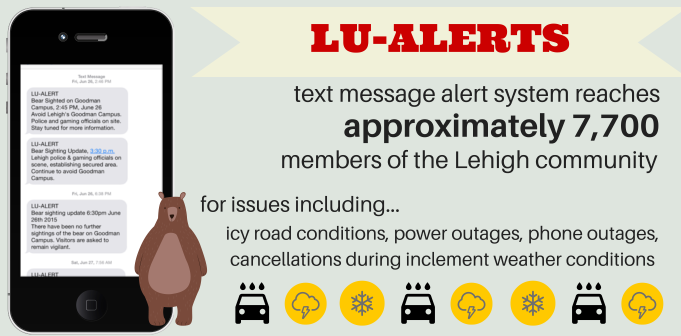The use of the Crisis Management Team and the utilization of several communication tools, which effectively inform students of emergency situations taking place, has led to efficient handling of emergencies.
Joe Sterrett, the chair of the Crisis Management Team, said that former university president Alice Gast wanted to form a team of senior campus leaders who could advise her and the board on any emergency scenario. Based on the recommendations of a consultant, Gast chose the members of the team.
The team is made up of seven people who each have their own responsibilities. During an emergency, there is always someone on the team looking at the financial, legal and academic implications, as well as the needs of the student body and the necessary forms of communications to be updated.
Communication Director Linda Harbrecht is in charge of the updates that are sent out through LU-ALERTS, emails and a variety of other communication tools. Harbrecht said the LU-ALERT text message system reaches approximately 7,700 members of the Lehigh community. It is a quick way to communicate about emergency situations or immediate danger to the campus.
Some of the updates sent through the LU-ALERTS have been about icy road conditions, power outages, closings and cancellations during inclement weather conditions.
Sterrett said although it might appear to be the majority of its work, the team does not just deal with natural crises. Part of its responsibility is to look ahead and consider scenarios that may become an emergencies later. This includes cyber threats or a breakout of an illness that, if the team isn’t communicating properly and managing the situation carefully, could become a much bigger problem.
“Everything that could be or could become a visible challenging circumstance that would affect the way that a university operates on a day-to-day basis is the kind of thing that we might gather to talk about and offer some recommendations or advice,” Sterrett said.
The team does not regularly deal with large emergencies like it has in the past with a meningitis breakout and Hurricane Sandy, but it meets at least twice a day during those situations to discuss what actions need to be taken. The team members have to think about how their actions will affect the student body, the finances, academics and other factors.
When the team discusses closing the campus because of a large snowstorm or a loss in power, it has to think about the students who cannot return home like others might be able to. The team has to work closely with the food suppliers, the power company and other operational experts to make sure the campus is running well enough for the students to live on campus.
Student safety is the most important thing that the team has to consider, but it is careful to not over-analyze some situations.
“That’s a challenge for the team, to not insist that it is a really big thing before we get on a conference call to talk about it,” Provost Pat Farrell said. “We don’t want it to be happening daily for small things, but we also want to be careful that we don’t make it only for the very biggest things because at times, modest-level things escalate quickly.”
With the evolution of technology, it has become easier and quicker for the team to gather and discuss the crisis at hand and then, in turn, alert the Lehigh community of the issue and the decisions on how to handle it. The LU-ALERT system has provided immediate information in emergency events, which is something that gives many students and parents peace of mind.
“We have a good process, although we never want to be overconfident,” Farrell said. “There’s always crises you didn’t anticipate and that’s part of the challenge, to try to be ready for things when you’re not really thinking about them…. I think we are as well prepared as we can be. There will always be surprises, but I think it’s good to be well prepared.”






Comment policy
Comments posted to The Brown and White website are reviewed by a moderator before being approved. Incendiary speech or harassing language, including comments targeted at individuals, may be deemed unacceptable and not published. Spam and other soliciting will also be declined.
The Brown and White also reserves the right to not publish entirely anonymous comments.